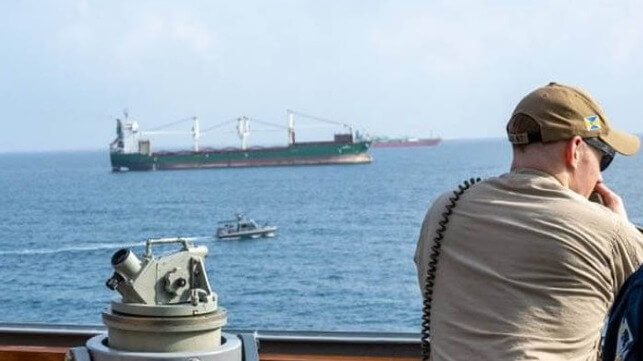All Ships Advised to Avoid Red Sea While Houthi Vow Retaliation for Strikes

All eyes remain on the Red Sea and the global reaction after the forces of the United States and United Kingdom supported by international partners finally struck out at the Houthi rebels after repeated warnings and 27 or more attacks on commercial shipping. The strikes were fast and broad-based hitting more than 70 targets ranging from command and control to munitions depots, launching systems, production facilities, and radar with missiles launched from sea and warplanes. The Houthis responded with new threats while saying that at least five people were killed and six others injured.
President Joe Biden issued a statement saying, “At my direction, U.S. military forces—together with the United Kingdom and with support from Australia, Bahrain, Canada, and the Netherlands—successfully conducted strikes against a number of targets in Yemen used by Houthi rebels to endanger freedom of navigation in one of the world’s most vital waterways.” While U.K. Prime Minister Rishi Sunak said the Royal Air Force carried out four strikes against which he called precision strikes “intended to disrupt and degrade the capabilities the Houthis use to threaten global trade and the lives of international mariners in one of the world’s most critical waterways.”
Privately U.S. officials speaking off the record have said they would not be surprised to see a response from the Houthi. Late on the day Friday, the U.K. Maritime Trade Organizations issued an alert saying they were investigating an incident 90 nautical miles southeast of Aden, Yemen in the Gulf of Aden.
It is being widely reported that the Combined Maritime Forces (CMF) command based in Bahrain issued an alter to the global shipping community recommending that all ships “stay well away from Bab al-Mandab" in the hours after the strikes. Global security consultants and trade groups are emphasizing the warning in their alerts.
On Jan. 11 at 2:30 a.m. (Sanaa time), U.S. Central Command forces, in coordination with the United Kingdom, and support from Australia, Canada, the Netherlands, and Bahrain conducted joint strikes on Houthi targets to degrade their capability to continue their illegal and… pic.twitter.com/bR8biMolSx
— U.S. Central Command (@CENTCOM) January 12, 2024
“Given these developments, Dryad Global strongly recommends that clients refrain from entering or operating in the Red Sea near Yemen and the Gulf of Aden for a minimum of 72 hours. This precautionary measure is crucial for ensuring the safety of personnel and assets until the situation stabilizes and a clearer assessment is available,” wrote one security firm.
Containerships for the most part have already diverted from the Red Sea. Container xChange for example calculated today that approximately 500 of the 700 containerships scheduled for the transit have already rerouted around Africa.
The warnings are now however being extended to other segments including bulk, oil, and gas, which have largely been less impacted. The International Association of Independent Tanker Owners (Intertanko) issued a member alert overnight advising that members should avoid the region. They are reportedly telling members that the threat period will last for at least several days. Oil prices briefly spiked after the news, reaching $80 in London and $75 in New York before stabilizing with New York trading now at about $73 a barrel.
Additional major oil carriers seem to be heeding the warnings. Shippers including BP and Equinor in December said they would be rerouting vessels, but today Bloomberg reports that carriers including Torm, Hafnia, and Stena Bulk had all reported that they are pausing transits through the Red Sea.
“There is never a straight line to a resolution and perhaps the missile strikes in Yemen by the U.S. and UK is the beginning of the endgame in this crisis, but, short term, things will get worse before they get better for ocean freight supply chains,” commented Peter Sand, Chief Analyst at Xeneta. He notes that ocean freight rates have already skyrocketed with for example the rate between the Far East and Mediterranean set to hit a 200 percent increase since mid-December.
Container xChange CEO Christian Roeloffs cautions that the near-term disruptions come as “there is growing demand for containers in Asia as shippers and forwarders foresee cargo demand in the coming weeks, to fulfill orders ahead of Chinese New Year.”
The uneasiness comes as Houthi officials threaten, “The battle will be bigger…and beyond the imagination and expectations of the Americans and the British.” Another spokesperson is writing that there will be a heavy price and dire consequences for the blatant aggression.
Russia responded by calling for an emergency meeting of the U.N Security Council. The organization which had previously supported the calls for an end to the attacks is now scheduled to convene Friday afternoon.

that matters most
Get the latest maritime news delivered to your inbox daily.
In a joint statement issued today, the international community said the aim remains to de-escalate tensions and restore stability in the Red Sea. However, they also cautioned “We will not hesitate to defend lives and ensure the free flow of commerce.” President Biden in his statement expressed a similar sentiment while adding he would “not hesitate to direct further measures,” to protect the free flow of international commerce.
